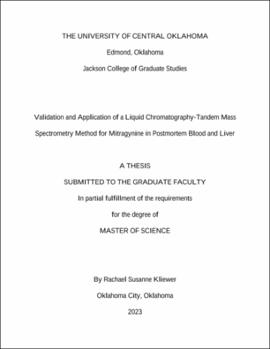| dc.description.abstract | Kratom is a tree originating in Southeast Asia, and has a history of usage among farmers. The leaves of the tree were chewed and used by farmers as a stimulant in order to work long days. Over the years, the popularity of the drug spread worldwide and has risen in recent years. In 2016, kratom was put on a Drugs of Concern list by the United States Drug Enforcement Administration (DEA). A lack of research including studies for mitragynine and 7-hydroxymitragynine has been observed, and there are even fewer postmortem case studies in the literature. The rise in kratom usage was noticed in the casework of the Office of the Chief Medical Examiner (OCME) Toxicology Laboratory in Oklahoma. The number of cases involving mitragynine, an alkaloid in kratom, has risen over recent years, but the OCME did not have a validated method for quantitation. The importance of this thesis project was to validate a method for the quantitation of mitragynine and qualitative identification of 7-hydroxymitragynine, assess the stability of the two alkaloids in three different storage conditions (ambient, refrigerated, and frozen), and examine real world cases coming through the OCME. The extraction utilized in this method was a phosphate buffer followed by filtering the samples using 3 mL columns containing diatomaceous earth. Extracts were then concentrated by drying them down, reconstituted, and washed with hexanes. The samples were then analyzed using liquid chromatography paired with tandem mass spectrometry (LC/MS-MS). The method for quantitation of mitragynine was validated with the criteria of interferences, bias, precision, ion suppression/enhancement, limit of detection, carryover, calibration model, and stability taken into consideration. The validation criteria for 7-hydroxymitragynine were interferences, ion suppression/enhancement, limit of detection, carryover, and stability. All criteria were met and deemed acceptable by the OCME lab's Quality Assurance Program. The stability study demonstrated that mitragynine is more stable in refrigerator conditions as opposed to freezer, and that 7-hydroxymitragynine went through an approximate 20% decrease over 65 days in the refrigerator in blood. The case studies had ranges of 130-1,400 ng/mL for heart blood, 130-1,300 ng/mL for femoral blood, and 220-7,000 ng/mL for liver. Central/Peripheral (C/P) and Liver/Peripheral (L/P) ratios were calculated to identify the potential for mitragynine to undergo postmortem redistribution (PMR). The C/P and L/P ratios were an average of 1.0 and 2.7 respectively, suggesting that mitragynine does not experience significant PMR. This thesis project will be adding to the body of knowledge concerning mitragynine and 7-hydroxymitragynine which will help researchers and postmortem labs assess the storage conditions of their specimen and help with interpretation of toxicology results in death investigations. | |
